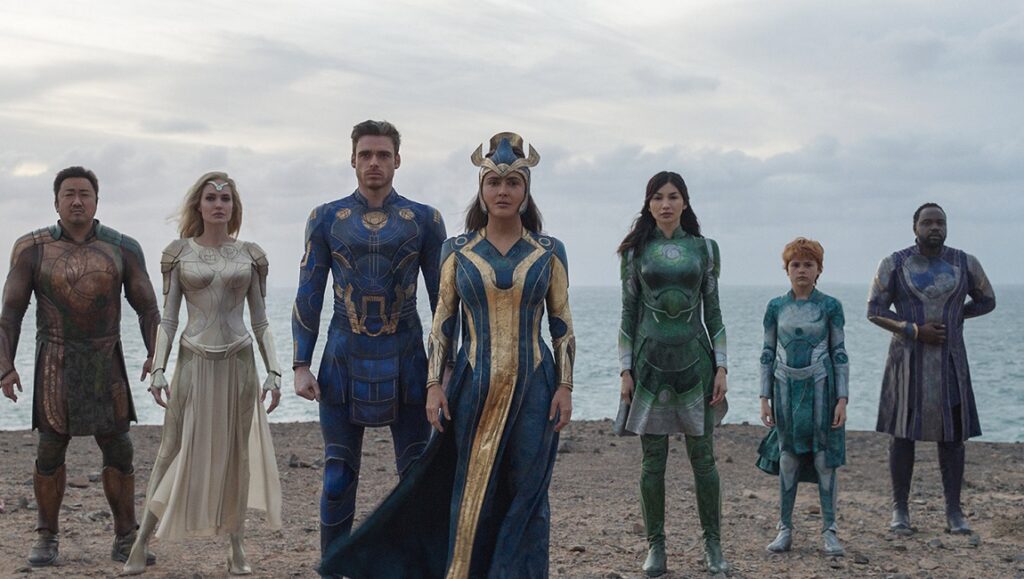Eternals makes its aims clear, but the whole enterprise is frictionless, resulting in one of the most flavorless Marvel films to date.
Meet the Eternals, featured in Marvel’s interminable newest installment bearing their name. A band of ageless superheroes brought to Earth eons ago to protect humanity (a thing they absolutely do not seem to have done, ever). Each with a different boring ability — super-speed, mind-control, one is “the Goddess of War,” and a couple of them can shoot laser beams or something — they appear to have spent their centuries either moping about or meddling in human affairs, like giving us the gift of technology, 2001-style, which comes in the form of a copper knife for some reason. Why would you give humanity weapons? Ask again later. They also fight these dumb aliens called Deviants sometimes.
There’s a lot to take in across this 160-minute mammoth, which in addition to introducing a whole new branch of the MCU, has also been charged with diversifying Marvel’s representational bona fides. The cast includes multiple performers of color, including sort-of main character Sersi (Gemma Chan), whose power is turning stuff into other stuff, and Kumail Nanjiani as Kingo (one of the laser beam guys). Bryan Tyree Henry is also here as Phastos (he’s their tech guy), who is also Marvel’s first openly gay character. Makkari (Lauren Ridloff) is also deaf. These may be baby steps as far as progress goes, but that doesn’t make them less laudable. The problem, however, is the characters are barely sketched beyond these identity markers, making, say, more prominent characters like Richard Madden’s Ikaris, who is just a white dude (who also shoots lasers), seem even more dull by comparison.
The story they’re populating could also hardly be more generic. There’s an attempt to generate drama by building the plot around a reunion of sorts: the team fractured years ago as their mission seemed to peter out, but the death of their former leader Ajak (Salma Hayek, wasted) brings them back together to confront an old alien threat. A great deal of the story is expository flashback meant to fill in the gaps of their various histories, but it also leads to ludicrous tangents like the reveal that Phastos taught humans how to make the atomic bomb that destroyed Hiroshima (much to his chagrin), or that they’re all actually sort of robots (something that would appear to undercut the stabs at diversity, but let’s not start nitpicking).
It all comes under the supervision of newly-Oscar-winning director Chloé Zhao, who in Eternals’ publicity has been named as the one to change the reputation of these films as being visually indistinct. She mostly fails. That’s not because Eternals looks just like all the other MCU films, but because the visual dynamic she’s brought to this one is both drab and ill-used; the on-location vistas she shoots are indeed lovely, but they’ve also been smeared with a bunch of digital doubles and crummy CGI monsters (the Deviants themselves wouldn’t be out of place, design-wise, in some mid-’90s junk or a network sci-fi TV show). That pretty, real sunset still has a bunch of fake people flying around it, throwing computer-generated rocks and stuff.
So in the end, it turns out all these half-assed attempts to be more diverse and dynamic have actually left a movie behind that’s as frictionless as possible. Zhao is obviously a capable filmmaker, but her talents are put to no discernible use here. The representationally progressive cast is given nothing to do. The script is still a jumble of clunky dialogue and exposition dumps with no stakes until the typical VFX-packed climactic fights. Eternals is one of the most flavorless films in the Marvel Universe, maybe even ever.


Comments are closed.